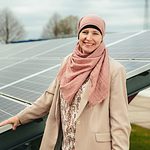
In the EU and in the Netherlands, the aim is to reduce greenhouse gas emissions to almost zero by 2050. This means we need to transform the current energy system, based on fossil fuels, into one that runs largely on renewable energy sources. This requires adjustments to the energy system.
New energy sources require new technologies on the supply side, for example for energy storage and energy carriers. The increasing variability on the supply side will also require adjustments on the demand side, with end-users for instance also taking on the role of producer (prosumer). There will also be a shift from largely separate markets for electricity, heat and fuels to more integrated markets, where, for example, electricity is also used for heat and transport services.
This requires critical thinking about market organisation of the new energy system. To ensure that the integrated energy market can deliver green, reliable and affordable energy. Law also plays a major role in the energy transition. Without legal frameworks, the investment climate can be less favourable, consumers are not protected or to a lesser extent, local and national governments lack resources to shape this energy transition, and unfair competition can exist. Energy law can be facilitative in both its presence and absence.
Within this professorship, we therefore look at the following issues:
- What are economic incentives for renewable energy?
- How do energy suppliers and customers come together in the market and how is this regulated legally and economically? In other words, how does the energy system work?
- What are legal preconditions in the energy transition, such as ownership, security and environmental law?
- How do we translate all this into policy?
Our people
-

Daisy Tempelman
Professor Legal and economic aspects of the energy transition
-

Wytze van der Gaast
Professor of Economic Aspects of the Energy Transition
- [email protected]
- Wytze van der Gaast
-
Zernikelaan 17, 9747 AA Groningen
-

Bert de Jonge
Professor Legal and economic aspects of the energy transition
- [email protected]
- Bert de Jonge
-
Zernikeplein 11, 9747 AS Groningen